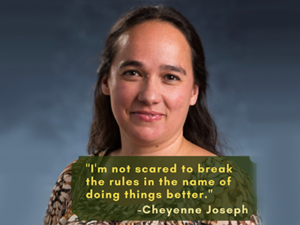Cheyenne Joseph

Topic: A Healthy Canada, without racism
Background:
Cheyenne Joseph is a member of the Mi’kmaq Nation in Wabanaki territory. She has over 15 years of experience as a Registered Nurse, certified in Community Health Nursing, and has worked almost exclusively with Indigenous communities in Atlantic Canada. For the past seven years, she has been a faculty member at the University of New Brunswick (UNB), helping to strengthen the nursing curriculum by embedding Indigenous wisdom and knowledge.
Now, Cheyenne works as Executive Director of an alcohol & drug rehabilitation centre that serves 11 First Nation communities in New Brunswick. The programs and services are deeply rooted in Mi’kmaq culture. “This work is about getting at the root of how we collectively got here, it’s about bringing them back to their cultural identity-whether reclaiming or finding it for the first time.”
Heartwork:
Deeply connected to her Mi’kmaq heritage through Elders, ceremonies and cultural events, Cheyenne has been curating a better future for the next seven generations as a matriarch and community leader, staying true to her ancestral path. This is most evident in her private time as the Mi’kmaq Mama where she embraces opportunities to be a positive and influential voice for family wellness and culture. It is her grassroots approach to wellness that truly make Cheyenne’s contributions to the KAIROS Blanket Exercise team invaluable, particularly for raising up reconciliation work in the Maritimes.
Indigenous Women:
For Cheyenne, restoring balance in all areas is part of the work that remains. The 2014 Shale Fracking protest saw the divides between Elsipogtog First Nation, a Mi’kmaq community, and surrounding anglophone and francophone communities lessen and unite on the front of land defense.
“For a while we were feeling like we were coming together,” recalls Cheyenne. “Then a car accident happened that cost the life of a young Indigenous man and the alleged driver was a local francophone resident who recently was acquitted on the charges.”
The microaggressions were first to return to interactions between the communities. “We have a weird Canadian way of being racist, it’s so subtle that the general public can’t spot it but it’s everywhere.” The teachings around racism have permeated Cheyenne’s work in health care and in educating nursing students preparing to work with Indigenous patients. “There needs to be more of a balance between knowing that Indigenous women are at risk, celebrating our cultural identities and respecting the knowledge we do carry.”



